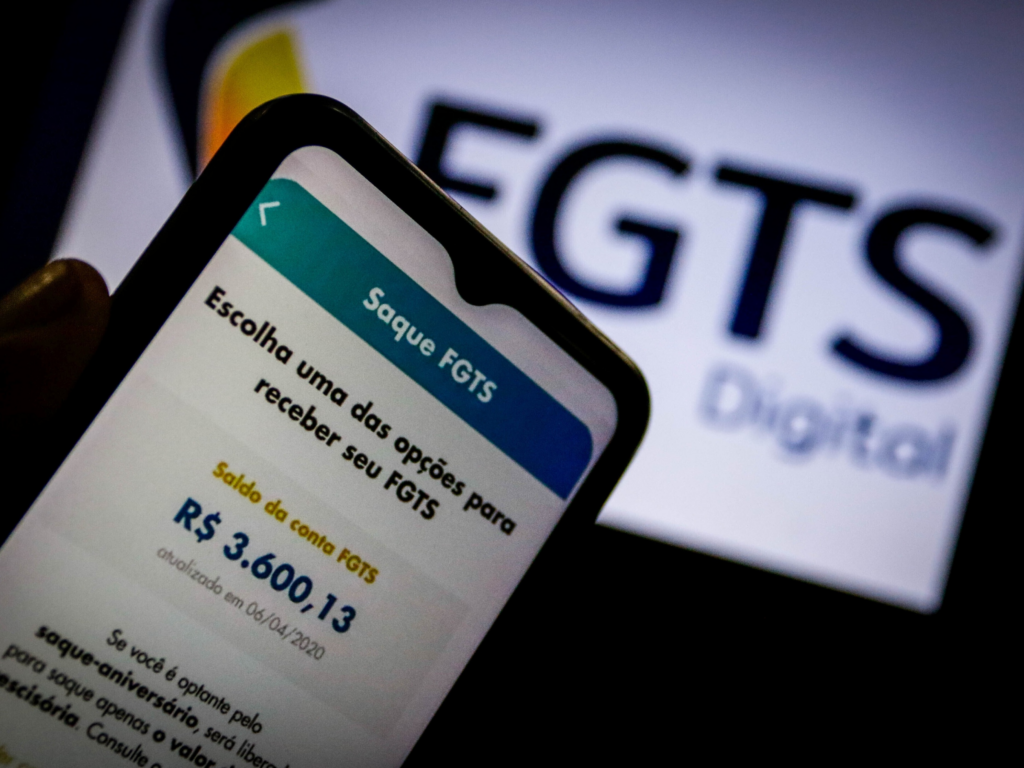The Severance Indemnity Fund (FGTS) is one of the main labor guarantees in Brazil. It was set up to protect workers in specific situations, such as dismissal without just cause, serious illnesses and home ownership.
Many workers wonder if they can withdraw all their FGTS money. In this article, we'll look at the conditions that allow you to withdraw in full and the situations in which this is possible.
You can withdraw all your FGTS money
The Severance Indemnity Fund (FGTS) is an essential financial reserve for Brazilian workers. Although the FGTS is usually seen as a compulsory savings account, there are situations in which it is permitted to withdraw the entire balance available in the linked account. Check out the situations below:
1. Unjustified dismissal
Unjustified dismissal is a significant event in the professional life of any employee. This type of dismissal occurs when the employer decides to terminate the employment contract without providing a valid legal reason for doing so.
In the Brazilian context, dismissal without just cause not only has immediate implications for the worker's job, but also triggers a series of labor rights, including access to the Severance Indemnity Fund (FGTS).
The FGTS is a fundamental right of every worker with a formal contract in Brazil. Every month, employers deposit a percentage of each employee's salary into an account linked to the FGTS. This fund acts as a kind of compulsory savings account, with the aim of protecting workers against unemployment.

When a worker is dismissed without just cause, he or she has the immediate right to withdraw the entire FGTS balance, as well as a 40% fine on the total amount deposited during the period of employment. This fine, established by labor legislation, is a way of compensating the worker for years of service to the company and aims to help them during the period of unemployment.
Access to the FGTS after unfair dismissal plays a fundamental role in a worker's financial security. In many cases, this financial reserve can be the difference between facing significant economic difficulties during the period of unemployment and having the peace of mind needed to look for a new professional opportunity with more confidence.
In addition, withdrawing FGTS after dismissal without just cause can also give workers the opportunity to invest in their personal and professional development. With the funds available, they can choose to take training courses, update their CV or even start their own business, looking for new sources of income and financial independence.
2. Retirement
Retirement marks a significant transition in the life of any worker, representing the end of a professional journey and the beginning of a new phase of life. In this context, access to the Severance Indemnity Fund (FGTS) plays a crucial role as an additional source of financial resources for retired workers.
Over the course of years of service, part of the worker's salary is deposited monthly into an account linked to the FGTS by the employer. This fund is a form of financial protection, designed to guarantee the worker's economic security in times of need, such as retirement.
Retirement is another period when you can withdraw all the money from your FGTS. This access offers an important source of additional financial resources that can be used in various ways to help plan for retirement. For example, workers can choose to use it to supplement their monthly income, ensuring greater financial stability during retirement.
In addition, the FGTS can also be used to purchase more valuable assets, such as a home. Many workers take advantage of this moment in their lives to invest in a residential property, using the FGTS balance as part of the payment or to reduce the value of the installments of a housing loan.
Therefore, access to the FGTS during retirement represents an important financial safety net for the worker, offering various possibilities for using this resource. Whether it's to supplement their monthly income, buy a property, invest in financial investments or carry out other personal projects.
3. Serious illness
When workers are diagnosed with a serious illness, they can withdraw all the money from their FGTS. This access to the fund provides a source of financial resources that can be used to cover medical expenses, treatment costs and medication, as well as helping to support the family during the period of incapacity for work.
In addition, access to the FGTS in cases of serious illness can also provide greater emotional peace of mind for workers and their families. By knowing that they have a financial reserve available to face the financial challenges arising from the illness, they can concentrate more fully on the treatment and recovery process, without the added burden of financial worries.
Another important aspect is that access to the FGTS allows workers the possibility of seeking more advanced or alternative medical treatments, which may not be covered by the public health system or conventional health plans. This financial flexibility can make a significant difference to a worker's quality of life and recovery prospects.
Therefore, access to the FGTS during periods of serious illness is more than a worker's right, it is an essential measure to guarantee their dignity and well-being in times of extreme fragility. Through this access, the FGTS becomes an important financial support tool, offering security and financial relief in times of adversity.
4. Buying your own home
Buying your own home is a significant milestone in anyone's life, symbolizing stability, security and personal fulfillment. In this context, access to the Severance Indemnity Fund (FGTS) plays a key role as a source of financial resources that can make this important goal possible.
When deciding to buy a house, workers have the option of using their FGTS balance as part of the payment or to reduce the value of their mortgage installments. This possibility offers a significant advantage, especially for those who find it difficult to save enough money to put a down payment on a property or to reduce the amount of the monthly mortgage installments.
In addition, access to the FGTS can allow the buyer greater flexibility in payment terms and in negotiating the financing. By using the FGTS balance as a down payment, for example, the worker can get lower interest rates or longer payment terms, which makes financing more accessible and viable.
Finally, it is important to emphasize that access to the FGTS when buying a home is a worker's right guaranteed by law. Therefore, it is essential that buyers are aware of their rights and seek appropriate guidance to make the most of this resource and make the best choice when purchasing their property.
5. Termination of Fixed-Term Contracts
When a fixed-term employment contract comes to an end, either due to the completion of the stipulated period or the end of the activity for which it was contracted, the worker faces a transition that can bring uncertainty about the future.
In other words, when a fixed-term employment contract comes to an end, the worker can withdraw all the money in the FGTS for the duration of the contract. This access to the fund provides a source of financial resources that can be used to meet immediate needs, such as basic expenses or looking for a new job opportunity.
Knowing that you have a financial reserve available to cover emergency expenses or to support yourself during a period of unemployment offers a sense of security and stability.
Another important aspect is that access to the FGTS at the end of a fixed-term contract can represent an opportunity to invest in professional training or personal development. With the resources available, workers can choose to take qualification courses, take part in professional relocation programs or even become entrepreneurs.
You can anticipate the FGTS without the Anniversary Withdrawal
For many workers, the Severance Indemnity Fund (FGTS) represents an important financial reserve that can be accessed in times of need. Although the Anniversary Withdrawal is an option for periodically withdrawing part of the FGTS balance, there are other ways to anticipate access to these resources.
- FGTS Guarantee Loan: In this case, the worker can use their FGTS balance as collateral to obtain a personal loan. This type of loan generally offers lower interest rates compared to other forms of loan, due to the security provided by the FGTS guarantee.
- Reducing Mortgage Installments: Many workers choose to use part of their FGTS balance to reduce the amount of their monthly mortgage installments. This strategy can provide significant savings over time, as it reduces the total amount paid in interest.
- Agreement between Employer and Worker: In some cases, workers can negotiate directly with their employer to advance their FGTS. Although this is not common practice, some companies may be willing to advance part of the FGTS balance as a way of helping the worker in times of financial need.
In summary, although the Anniversary Withdrawal is an option for periodically withdrawing FGTS, there are other alternatives for anticipating access to these funds. However, it is important to evaluate each alternative carefully, considering the benefits and possible long-term consequences.
It is possible to withdraw the blocked FGTS balance
Now that you understand that you can withdraw all your FGTS money, another common question among Brazilian workers is: is it possible to withdraw the blocked balance?
The Severance Indemnity Fund (FGTS) is an important financial reserve for Brazilian workers, but in certain situations the available balance can be blocked.
An alternative way of accessing the blocked FGTS balance is through a loan guaranteed by the fund. In this case, workers can use their FGTS balance as collateral to obtain a personal loan. This can be especially useful in financial emergencies, allowing the worker to use part of the blocked balance as a way of obtaining immediate funds.
Another possibility is to seek direct negotiation with the employer. In some cases, especially when the FGTS is blocked due to issues related to the employment contract or the employer, it is possible to negotiate the release of the blocked balance directly with the employer.
In certain cases, the FGTS block is temporary and can be unblocked automatically after a certain period of time. For example, if the FGTS balance has been blocked due to a lawsuit or labor dispute, automatic unblocking can occur after the case is closed or the legal issue is resolved.
In more complex situations, it may be necessary to seek legal advice to understand the options available and the procedures required to unblock the FGTS balance. A lawyer specializing in employment law can help the worker assess the situation, identify the best alternatives and take the appropriate steps to resolve the problem.
In summary, although blocking the FGTS balance can be a challenge for workers, there are alternatives available to access these funds.

What is the maximum amount of the FGTS loan?
With regard to the maximum amount of the FGTS loan, it is important to note that it is subject to certain limitations established by Caixa Econômica Federal, which manages the fund.
Generally, the maximum loan amount is up to 40% of the available balance in the worker's FGTS account. This limit is set to ensure that the worker keeps a significant part of their financial reserve intact and to avoid excessive indebtedness.
Given the limitations on the maximum amount of the FGTS loan, it is important for workers to consider other alternatives to meet their financial needs. One option is to seek personal loans from traditional financial institutions, which can offer different conditions and payment terms.
See also: How can I find out my PIS number using my CPF? See the ways to check
April 3rd, 2024

She has a degree in Literature - Portuguese/English, and is the creator of the Escritora de Sucesso website. As a writer, she seeks to expand everyone's knowledge with relevant information on various subjects. At Trend-Topics, she brings news and content ranging from entertainment to the country's economic situation.






